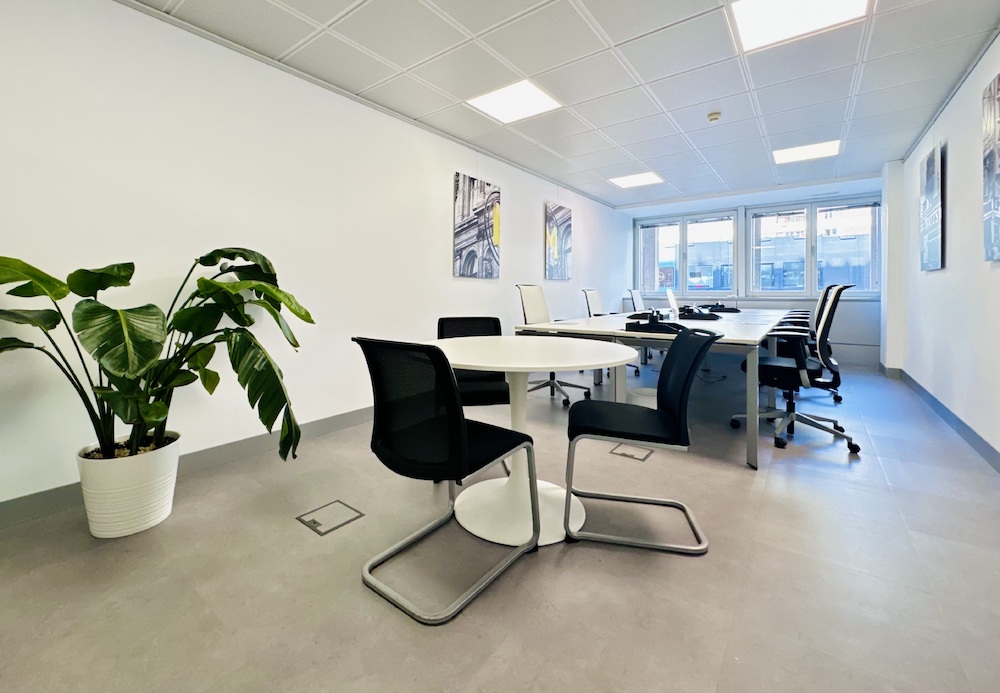We will share with you the best tips for creating a strong corporate culture from day 1.
From the very first moment a company is born, corporate culture plays a crucial role in its development and long-term success. This culture, which can be understood as the set of values, beliefs and practices that define the identity of an organisation, is not just a secondary or decorative aspect; it is the foundation on which everything else is built.
A strong culture from the outset enables everyone in the company to share a common vision, which facilitates decision-making, team cohesion and resilience in the face of challenges.
When a company clearly defines its culture from its first steps, it is laying the foundation for future growth. Organisations that manage to establish and maintain a coherent culture tend to be more successful in the long run, as this culture becomes an internal guide that orients every action and decision.
In addition, a strong corporate culture helps to attract and retain talent, improve employee satisfaction and create a brand identity that is recognised and respected in the marketplace. In short, corporate culture is not a static element, but a dynamic factor that, if cultivated correctly from the outset, can be a real driver of success.
The company’s values and mission
Defining a company’s values and mission from the outset is an essential step in building a strong and coherent culture. Core values act as the heart of the organisation, dictating how its members behave and how decisions are made. Identifying them requires deep reflection on what really matters to the company, beyond immediate business objectives. These values must resonate with both founders and employees, being genuine and relevant to the company’s purpose and long-term vision.
Articulating a clear and motivating mission is the next step. The mission should encapsulate the essence of what the company seeks to achieve, not only in terms of products or services, but also in the impact it wants to have on the world. A well-defined mission not only inspires those within the organisation, but also communicates to the outside world who they are and why they exist.
The key is to be specific and authentic: a vague or generic mission is unlikely to motivate or guide effectively.
There are numerous examples of companies that have succeeded in building strong corporate cultures based on values and a clear mission. A case in point is Patagonia, the outdoor clothing company. Since its inception, Patagonia has focused on values such as sustainability and respect for the environment, integrating these principles into every aspect of its business. Its mission statement, “We are in business to save our home, planet Earth”, not only motivates its employees, but also attracts consumers who share those same concerns.
Another example is Zappos, whose focus on customer service excellence and creating a positive work environment has been key to its success. The company has articulated these values clearly and lives them in every interaction, which has strengthened its reputation and allowed it to build a loyal community of both employees and customers.
Ultimately, defining a company’s values and mission is not just a symbolic exercise; it is a fundamental process that influences every aspect of the organisation. When these elements are well defined and aligned with daily actions, it creates a strong company culture that not only drives success, but also provides a sense of purpose and direction for everyone involved.
The importance of recruitment
Hiring people who share the company’s values is essential to preserve and strengthen the company’s culture. Each person who joins the organisation has the potential to influence its environment, either to consolidate the existing culture or to divert it in an undesirable direction.
It is therefore vital that new employees not only possess the necessary technical competencies, but also that they are aligned with the company’s values and mission. This alignment ensures that all team members work in sync, which facilitates cooperation and reinforces a shared sense of purpose and belonging.
The selection process plays a crucial role in identifying candidates who not only have the right talent, but are also a cultural fit. From the first contact, it is important that the company clearly communicates its values and what it expects from its employees in terms of behaviour and attitude.
During interviews, beyond assessing skills and experience, it is essential to explore how candidates have acted in situations that reflect the company’s values. Asking about specific examples where they have demonstrated qualities such as integrity, teamwork or innovation can be revealing. In addition, involving several team members in the selection process can help ensure that the candidate is a good fit with the group’s culture.
As the company grows, maintaining cultural coherence becomes an even greater challenge. With expansion, it is easy for core values to become diluted, especially if hiring becomes faster or less rigorous. To counter this risk, it is key to establish practices and policies that continually reinforce culture.
For example, implementing a mentoring programme where senior employees pass on the company’s values to new recruits can be very effective. In addition, it is useful to hold regular training and reflection sessions on the company’s values and mission, ensuring that these are kept alive in everyone’s mind, regardless of their seniority in the company.
Finally, leadership must be constantly engaged with culture. Leaders must not only lead by example, but also be proactive in creating an environment where the company’s values are lived and breathed in every corner of the organisation. This not only strengthens internal cohesion, but also projects a clear and consistent image to the marketplace, which can be a key differentiator in the competitive business arena.
Leadership as a model of corporate culture
Leadership plays a key role in promoting and consolidating corporate culture. Leaders are not only responsible for defining the vision and values of the company, but must also embody them in their daily behaviour.
The way a leader acts, makes decisions and relates to his or her team has a direct impact on organisational culture. When leaders become role models, they demonstrate through their actions what it means to live the company’s values, inspiring others to do the same.
Examples of leaders who have established a strong culture abound in the business world. Steve Jobs, for example, is widely credited with establishing a culture of innovation and perfectionism at Apple. His relentless focus on quality and design not only defined the company’s products, but also permeated all layers of the organisation.
In a different context, Indra Nooyi, former CEO of PepsiCo, promoted a culture of social responsibility and sustainability, integrating these values into the company’s global strategy. Under her leadership, PepsiCo focused not only on economic growth, but also on the well-being of its consumers and the planet, reflecting a broader and more conscious view of business.
For leaders to foster and reinforce corporate culture, they must be consistent and coherent in their communication and behaviour. It is crucial that what they preach is in line with what they practice; any dissonance can generate distrust and erode the culture they are trying to establish.
In addition, leaders must be committed to active listening, gathering feedback from their teams to understand how the company’s values are perceived in practice. Initiatives such as regular meetings where examples of how the values are being lived out on a day-to-day basis are discussed and celebrated can be very effective.
Another key strategy is to recognise and reward behaviours that reflect the desired culture. When employees see that their actions aligned with the company’s values are appreciated and rewarded, it reinforces the importance of those values.
Leaders can also foster corporate culture by creating opportunities for employees to actively participate in initiatives that reflect those values, such as volunteer projects or professional development programmes that are aligned with the company’s mission.
In short, leaders are the guardians and promoters of corporate culture. Their influence is decisive in maintaining the cohesion and direction of the organisation, ensuring that the values that define the company are not only stated, but lived out on a daily basis.
When leaders lead by example and are deeply committed to the culture they want to establish, the foundations are laid for a strong, coherent and successful organisation.
Internal communication as a model of transparency
Effective internal communication is one of the cornerstones of a strong corporate culture. Transparency and open communication not only foster an environment of trust and collaboration, but are also essential to ensure that all members of the organisation are aligned with the company’s goals and values.
When information flows in a clear and accessible way, employees feel more involved and committed to their work, which strengthens internal cohesion and facilitates decision-making.
Transparency in communication involves sharing both the successes and challenges facing the company. This approach creates an environment where employees not only feel valued, but also feel an integral part of the company’s journey.
In addition, by promoting open communication, employees are encouraged to express their ideas, concerns and suggestions, which can result in innovative solutions and a greater sense of ownership. Lack of communication, or poor communication, can lead to misunderstandings, rumours and mistrust, quickly eroding corporate culture.
To maintain communication aligned with the company’s culture, it is essential to use tools and practices that facilitate effective and consistent information sharing. Regular meetings, both at team and company-wide level, are crucial to keep everyone informed and in tune with the corporate vision and values.
These meetings should be spaces where active participation is encouraged and key messages that reflect the culture of the organisation are reinforced. In addition, digital platforms such as intranets, internal chats and newsletters are valuable tools to keep communication flowing, especially in hybrid or remote work environments.
These tools should be used not only to share operational information, but also to highlight stories and examples that illustrate how the company’s values are being lived out on a day-to-day basis.
There are numerous success stories where internal communication has been key to strengthening corporate culture. One notable example is Google, which from its inception has cultivated a culture of transparency and openness. Through practices such as “TGIF” (Thank God It’s Friday), weekly meetings where founders and leaders share updates and answer questions from employees, Google has maintained an environment where everyone feels informed and listened to, despite its large size.
This transparency has been fundamental to maintaining a culture of innovation and collaboration.
Another example is Netflix, whose open communication policy is reflected in its famous “Culture Deck”, a document that clearly details the company’s values and expectations. This approach has allowed Netflix to maintain a strong and consistent culture even as it has experienced exponential growth.
Ultimately, effective internal communication is not just a channel for transmitting information, but a strategic tool for building and strengthening corporate culture. When carefully managed and aligned with the company’s values, it can be a powerful driver of organisational success, creating an environment where all members feel connected, informed and motivated to contribute to the company’s growth and development.
Promoting a healthy environment
Fostering a positive work environment is essential to the success of any business. An environment where employees feel valued, supported and motivated not only improves individual well-being, but also boosts productivity and strengthens loyalty to the organisation.
Creating a collaborative and motivating environment requires a conscious and consistent approach by leaders and the entire organisational structure. It is not enough to implement isolated policies; it is necessary to cultivate a culture that promotes cooperation, mutual respect and personal development.
One of the most effective strategies for building a collaborative environment is to foster open communication and teamwork. This means not only encouraging employees to share ideas and opinions, but also ensuring that they feel their contributions are valued and taken into account. Creating physical and virtual spaces that facilitate collaboration, such as common work areas or digital brainstorming platforms, can go a long way in this regard.
In addition, it is essential to recognise and celebrate the team’s achievements, not only individually, but also collectively. This recognition not only reinforces team spirit, but also motivates employees to continue contributing in a positive way.
The work environment has a direct impact on productivity and employee loyalty. When people feel happy and comfortable in their workplace, they tend to be more committed to their tasks and more efficient. A positive environment reduces stress, which in turn reduces absenteeism and turnover rates.
In addition, when employees perceive that the company cares about their well-being, they are more likely to develop a sense of belonging and loyalty to the organisation, which translates into a lower likelihood that they will seek opportunities outside the company. Conversely, a toxic environment can lead to demotivation, conflict and, ultimately, a loss of valuable talent.
There are many policies that companies can implement to promote a healthy work environment. One of the most effective is flexible working hours, which allows employees to better balance their personal and professional lives, contributing significantly to their well-being. Another important policy is the promotion of physical and mental well-being, through health programmes, access to sports activities or even the creation of relaxation spaces in the office.
Some companies, such as Microsoft, have adopted a four-day work week to improve work-life balance, which has proven to have a positive impact on employee satisfaction and productivity.
On the other hand, companies such as Salesforce have launched volunteering programmes, allowing employees to dedicate part of their working time to social causes. This initiative not only reinforces the company’s commitment to social responsibility, but also enhances employees’ sense of purpose and satisfaction.
Ultimately, a positive work environment not only benefits employees, but is also an investment in the long-term success of the company. Creating an environment where people feel valued, motivated and part of something bigger is key to achieving sustained productivity and lasting loyalty.
The use of a business centre as a pillar of corporate culture
Achieving a positive working environment and a strong company culture is a challenge that all companies face, and choosing the right space for your team can make a big difference.
At Ibercenter, we understand the importance of creating an environment that not only facilitates productivity, but also fosters collaboration, wellbeing and the personal and professional growth of each member of your team. Our office rental services in Madrid and meeting room rental in Madrid are designed to offer you the flexibility and support you need for your business to thrive.
A business centre like Ibercenter is not just a physical space; it is an ecosystem designed to enhance the development of your company. By choosing to rent office space in a professional and well-equipped environment, you ensure that your team has everything they need to work in a comfortable and motivating environment. What’s more, our offices are located in prime locations in Madrid, which not only facilitates access, but also projects a professional and solid image of your company to clients and partners.
But at Ibercenter we don’t just offer a workspace; we also have a wide variety of meeting rooms for rent in Madrid for meetings, training and events. These rooms are designed to suit your needs, with flexible configurations and high quality equipment, allowing you to hold productive and efficient meetings in an environment that reinforces your company’s professionalism and commitment.
Moreover, by being in a business centre, you benefit from an environment where collaboration and networking come naturally. Surrounding yourself with other companies and professionals who share a common space can open up new business opportunities, without leaving your work environment. This daily interaction with other companies can be a source of inspiration and a catalyst for growth and innovation in your own organisation.
In short, Ibercenter offers you much more than a workspace; it provides you with a complete environment where your business can grow in a healthy and sustainable way. By choosing to work in our facilities, you are ensuring that all the fundamental aspects of a positive working environment, from comfort to collaboration, are covered, allowing you and your team to focus on what matters most: growing your business.
Conclusion
In conclusion, building and maintaining a strong company culture from the outset is critical to the success of any business. Throughout this analysis, we have explored how defining clear values and mission, hiring people aligned with those values, exercising leadership that acts as a role model, and establishing effective internal communication are all key elements that contribute to creating a positive and cohesive work environment.
These components not only strengthen the company’s identity, but also boost productivity, employee satisfaction and loyalty – essential factors for sustainable growth.
Consistency and commitment to corporate culture are vital. It is not enough to define values and policies; they need to be lived and reinforced on a daily basis, in every decision and action taken within the organisation. This commitment must be shared by everyone, from leaders to every team member, ensuring that the culture is not only maintained, but evolves in a way that is consistent with the objectives and challenges that the company may face over time.
A strong corporate culture is not simply a set of rules or guidelines, but a living force that guides and motivates everyone in the company. Its impact on long-term success is undeniable: companies with a strong and well-defined culture tend to be more resilient, innovative and able to attract and retain talent.
In an increasingly competitive business world, culture can be the differentiating factor that allows a company not only to survive, but to thrive. In the end, investing in corporate culture is investing in the future of the organisation, ensuring that it is ready to meet any challenge and seize any opportunity that presents itself.






